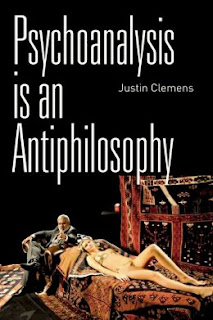 He applied the “Page 99 Test” to his latest book, Psychoanalysis is an Antiphilosophy, and reported the following:
He applied the “Page 99 Test” to his latest book, Psychoanalysis is an Antiphilosophy, and reported the following:This book takes up the problems confronting psychoanalysis today under the rubric of ‘antiphilosophy.’ In a contemporary mental-health environment that is essentially governed by so-called Big Pharma, new developments in neuroscience, and a variety of cognitive therapies, is there anything left for psychoanalysis — an old-school psychology famous mainly as a ‘talking cure’ — to contribute? Perhaps unsurprisingly, my answer is: yes!Learn more about Psychoanalysis is an Antiphilosophy at the Oxford University Press website.
The key to my answer hinges on the singular relationship forged between science and literature by Sigmund Freud. Although the history of psychoanalysis has been marked by wild oscillations between attempts to make it stick as a hard-science and countervailing attempts to bill it as a humanistic, hermeneutic enterprise, I see these oscillations as, precisely, symptomatic of the fact that psychoanalysis is, strictly speaking, neither a science nor a hermeneutics, but a new kind of therapy that relies essentially on both science and hermeneutics.
The French philosopher Alain Badiou has pointed out that Plato created philosophy by means of a specific conceptual operation: Plato curbs the divisive, emotional poetic appeals that underpin regular political life in the Athenian city by recourse to the abstract, rigorous, and universal powers of mathematics. But if Plato injected mathematics into poetry to invent philosophy, Freud went precisely in the opposite direction in inventing psychoanalysis. In order to understand the peculiar structure of hysteria, Freud found ‘that local diagnosis and electrical reactions lead nowhere… whereas a detailed description of mental processes such as we are accustomed to find in the works of poets enables me, with the use of a few psychological formulas, to obtain at least some kind of insight into the course of that affection.’ This is the meaning, then, of antiphilosophy: a practice that injects the lessons of poetry into medicine, requiring a double attentiveness simultaneously to the requirements of the sciences (their observational, experimental, falsifiable aspects) and to the demands of art (their symbolic, experimental, affective aspects).
The book’s chapters track this double-requirement in the work of Freud, Jacques Lacan, the Italian philosopher Giorgio Agamben and others, with respect to psychoanalytic understandings of various psychopathological conditions, slavery and torture. Page 99 of this book turns out to be exemplary of my argument. In explicating Agamben’s work, I show how his account of the clinical category of melancholia renders it a form of political-poetic action in extremis as well as a kind of affront to scientific knowledge in particular.
--Marshal Zeringue



